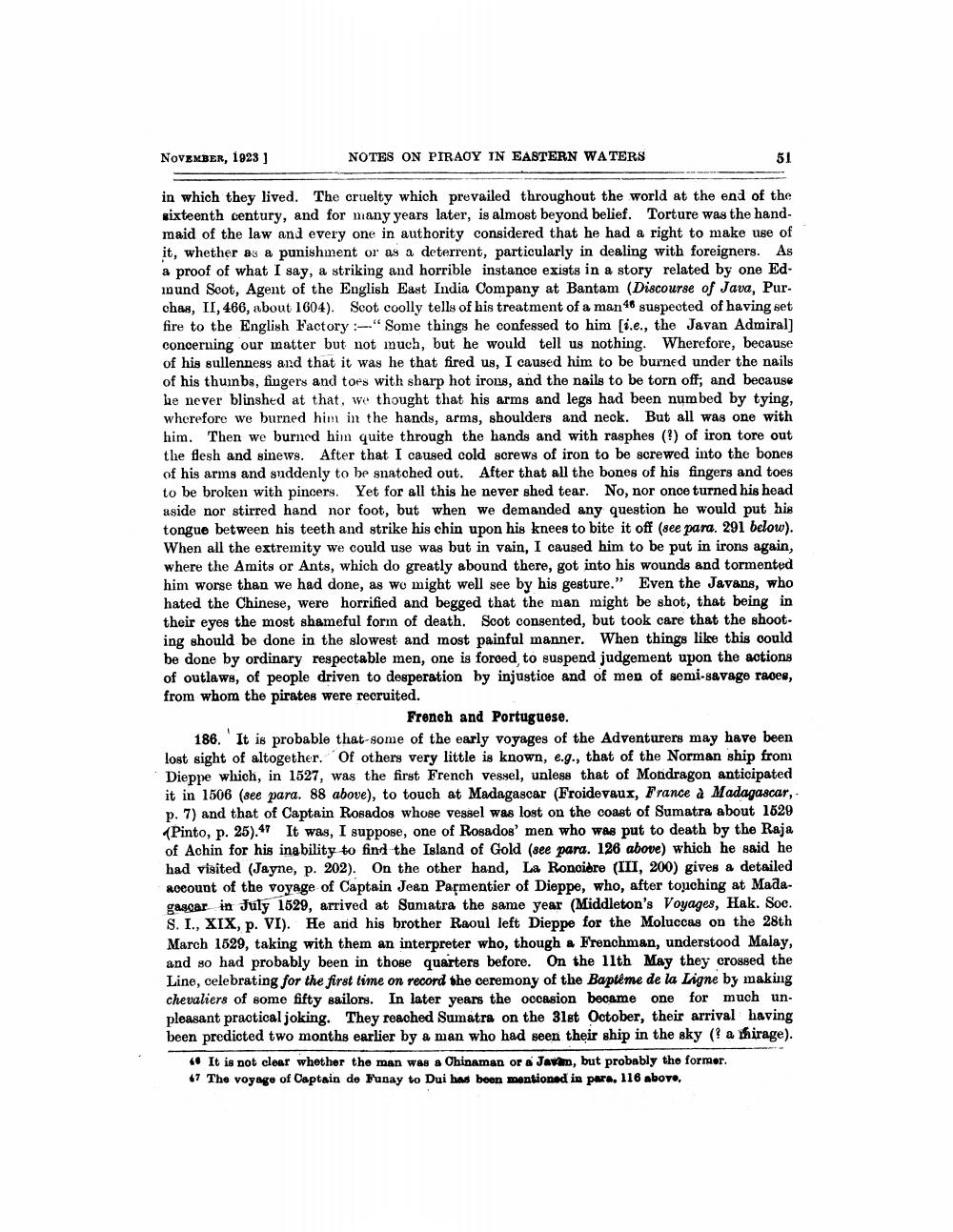________________
NOVEMBER, 1923]
NOTES ON PIRAOY IN EASTERN WATERS
in which they lived. The cruelty which prevailed throughout the world at the end of the sixteenth century, and for many years later, is almost beyond belief. Torture was the handmaid of the law and every one in authority considered that he had a right to make use of it, whether as a punishment or as a deterrent, particularly in dealing with foreigners. As a proof of what I say, a striking and horrible instance exists in a story related by one Ed. mund Soot, Agent of the English East India Company at Bantam (Discourse of Java, Purchas, II, 466, about 1604). Soot coolly tells of his treatment of a man 46 suspected of having set fire to the English Factory :-." Some things he confessed to him [i.e., the Javan Admiral] concerning our matter but not inuch, but he would tell us nothing. Wherefore, because of his sullenness and that it was he that fired us, I caused him to be burned under the nails of his thunbs, fingers and toes with sharp hot irons, and the nails to be torn off, and because he never blinshed at that, we thought that his arms and legs had been numbed by tying, wherefore we burned him in the hands, arms, shoulders and neck. But all was one with him. Then we burned him quite through the hands and with rasphes (?) of iron tore out the flesh and sinews. After that I caused cold screws of iron to be screwed into the bones of his arms and suddenly to be snatched out. After that all the bones of his fingers and toes to be broken with pincers. Yet for all this he never shed tear. No, nor once turned his head aside nor stirred hand nor foot, but when we demanded any question he would put his tongue between his teeth and strike his chin upon his knees to bite it off (see para. 291 below). When all the extremity we could use was but in vain, I caused him to be put in irons again, where the Amits or Ants, which do greatly abound there, got into his wounds and tormented him worse than we had done, as wo might well see by his gesture.” Even the Javans, who hated the Chinese, were horrified and begged that the man might be shot, that being in their eyes the most shameful form of death. Soot consented, but took care that the shooting should be done in the slowest and most painful manner. When things like this could be done by ordinary respectable men, one is forced to suspend judgement upon the actions of outlaws, of people driven to desperation by injustice and of men of semi-savage races, from whom the pirates were recruited.
French and Portuguese. 186. It is probable that some of the early voyages of the Adventurers may have been lost sight of altogether. Of others very little is known, e.g., that of the Norman ship from Dieppe which, in 1527, was the first French vessel, unless that of Mondragon anticipated it in 1506 (see para. 88 above), to touch at Madagascar (Froidevaux, France à Madagascar, p. 7) and that of Captain Rosados whose vessel was lost on the coast of Sumatra about 1629 (Pinto, p. 25).47 It was, I suppose, one of Rosados' men who was put to death by the Raja of Achin for his inability to find the Island of Gold (see para. 126 above) which he said he had visited (Jayne, p. 202). On the other hand, La Roncière (III, 200) gives a detailed account of the voyage of Captain Jean Parmentier of Dieppe, who, after touching at Madagascar in July 1529, arrived at Sumatra the same year (Middleton's Voyages, Hak. Soc. S.I., XIX, p. VI). He and his brother Raoul left Dieppe for the Moluccas on the 28th March 1629, taking with them an interpreter who, though a Frenchman, understood Malay, and so had probably been in those quarters before. On the 11th May they crossed the Line, celebrating for the first time on record the ceremony of the Baptême de la Ligne by making chevaliers of some fifty sailors. In later years the occasion became one for much unpleasant practical joking. They reached Sumatra on the 31st October, their arrival having been predicted two months earlier by a man who had seen their ship in the sky (1 a Firage).
** It is not clear whether the man was a Chinaman or a Javan, but probably the former. +7 The voyage of Captain de Funay to Dui has been mentioned in para, 116 abovo,




